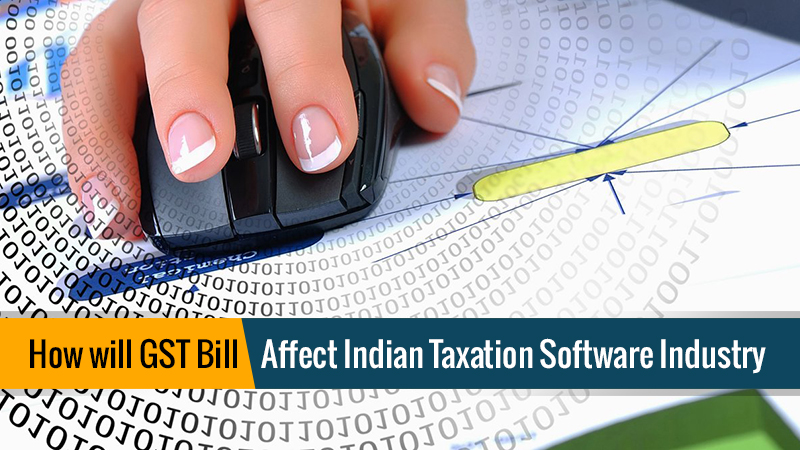The Goods and Services Tax Bill after being passed in both the houses of parliament officially known as The Constitution (One Hundred and Twenty-Second Amendment) Bill, 2014 is implemented from 1 April 2017.
In the Indirect Tax Law system, there were many taxes levied like Central Excise duty, Service tax, Countervailing duty and Central Sales tax and State level taxes like VAT, Entertainment tax, Entry tax, Purchase tax, Luxury tax, and Octroi, etc.
With the GST bill passed, now all these taxes are encompassed in a single tax, i.e. GST. To adapt these changes, it would involve time, effort and a lot of work in the whole planning, implementation, and application of the new changes pertinent to the GST law. Also, a lot of effort would be required in terms of training their employees and working in compliance with the new regulation.
But the most important work over here is the software that handles the accounting of the company. Most accounting software in India is designed keeping the regulations in mind. So the tax computing was not a difficult task. But, after GST implementation, the most difficult task for the software companies is to manage the constant changes in the GST law and its functionalities.
The return form itself has no set format yet, as in each meeting, there are some new changes made which is a tedious job for the developers to develop a system coherent with the new changes.
GST law has been implemented with a new and wider concept. The new software to be designed should be simple and user-friendly to do all the related tax calculations, and also make return filing an easy task. Developers have to work on the new system to make its working simple and user-friendly, which would require a lot of time and effort.
Although there are many complexities which arise during the development of new software using a new coding language. While writing the code in the new language for the first time, there are a lot of chances of bugs which may create problems in the functioning of the software. Appointment and training of new employees for working in a new language, which will result in increased costs to the industries.
In the development of the new GST software, companies need to keep in mind the integration with the accounting software for the import of data, which might cause a few hiccups for the developers to create a new GST system. In order to remove such barriers, other software will also require some modifications to adapt along with new changes.
Existing Indirect Tax software will have to be shut down and will require decommissioning and preservation, and archival of all the data that has been stored over the years of use. For an assesse, it will be very difficult to switch from old software to new software and to adopt GST.
There are still some products on which GST is not applicable, for which old taxes like customs, excise, etc, will also have to be incorporated into new software and to make it scalable, which will be again an additional work for the developers. It will increase the cost of development.
Earlier the tax software was made to meet the Tax need of the people, but now it should be according to both the business needs and the tax needs so that it becomes easier to fill the return without any defects. While developing the software, coding, looping, hyperlink, etc is a very time-consuming task for the developers and on domain part too.
In automation, many times looping has to be done which require more coding. For goods and services data are different due to that repetitive coding and looping will have to be made separately for both and integrate them. Managing the database into the new process seamlessly is also one of the challenging tasks.
Time is of the essence here. To provide better and painless transition services to the user, all the software companies need to jump in line to understand the nitty gritty of the concept behind GST and its implications for scenario planning and preparing a transition road-map. Proactive actions are needed to implement the new changes with an updated version of the related software. The aim is to get a software which can not only compute GST but is also scalable and adaptable to any new changes that come along the way!!!!











Hello Sir, I request you to clarify 2 doubt. Before GST regime, there was withholding tax on software licenses import through internet. Would this be continued after GST?
My second question is : There was no import duty, but were SAD etc. ware applicable on Software imports? What happens to these after GST?
SAD have been subsumed in GST.